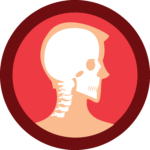Temporomandibular Joint Dysfunction (TMD)
TMD (Temporomandibular Joint Dysfunction) Physical Therapy
Welcome to The Jackson Clinics! If you’re struggling with TMJ pain or discomfort, you’re in the right place.
Our skilled team of Temporomandibular Joint Dysfunction specialists is here to help you find relief and enhance your quality of life.
Physical Therapy For TMD
– The GOAL of Physical Therapy
The goal of Physical Therapy treatment for Temporomandibular Joint Dysfunction (TMD) is to provide pain relief using a variety of techniques to improve your range of motion through exercise and manual therapy and to improve posture and muscle imbalance.
There may be modifications to your activities or work station that would be helpful as well.
– Benefits of Physical Therapy For TMD
TMJ physical therapy can significantly improve your condition and quality of life.
Here’s how:
- Pain Relief: Techniques like manual therapy, exercises, and stretches can alleviate pain and discomfort by reducing muscle tension and enhancing joint mobility.
- Restored Jaw Function: Physical therapy helps improve jaw mobility, strength, and coordination, allowing you to perform everyday activities more comfortably.
- Improved Quality of Life: By addressing the root causes of TMJ disorders, physical therapy can enhance daily activities, social interactions, and overall emotional well-being.
Offered At:
Herndon/Worldgate
Inside Onelife Fitness
13039 Worldgate Dr.
Herndon, VA 20170
Tel: 703.689.3164
Fax: 888.974.0316
Sterling
Inside OneLife Fitness-Sterling
46262 Cranston St #115B
Sterling VA 20165
Tel: 571.306.4113
Fax: 877.422.7707
TJC Concierge
A Jackson Clinics Partner
Expert Care On Your Time, On Your Turf
Tel: 877.789.0757
TMD vs TMJ: What’s The Difference?
Before we dive deeper, you may be wondering what the difference is between TMJ and TMD.
While TMJ (Temporomandibular Joint) and TMD (Temporomandibular Disorder) are often used interchangeably, they refer to different aspects of jaw health.
- TMJ: Refers specifically to the temporomandibular joint, which connects the jawbone to the skull and enables jaw movement.
- TMD: Refers to a range of disorders affecting the TMJ and surrounding muscles, ligaments, and tissues. These disorders can cause symptoms like jaw pain, clicking sounds, headaches, and difficulty moving the jaw.
– What is TMJ?
The temporomandibular joint (TMJ) connects your jawbone to your skull and is crucial for speaking, eating, and yawning.
Located in front of your ears on both sides of your head, it can become problematic due to inflammation or misalignment.
– What is TMD?
Temporomandibular dysfunction (TMD) refers to conditions causing pain and impairments of the temporomandibular joints (TMJ) and surrounding muscles.
The joint and muscles work together to control movement of the jaw, and they require coordination to complete daily tasks, such as yawning and chewing.
Frequently, TMD includes symptoms such as clicking, popping, locking and grinding in the jaw. You may also experience headaches, dizziness, sinus pain and ear ringing related to TMD.
The TMJ and neck have a close relationship, and often treatment of both can lead to the greatest improvements.
Causes & Symptoms of Temporomandibular Joint Disorders
– Causes of TMJ Pain
Understanding what triggers your TMJ pain is the first step to finding relief.
Here are three common causes:
- Misalignment of the Jaw: A misaligned jaw can lead to pain and discomfort. Trauma, genetics, or developmental issues might be the cause. Physical therapy can help realign your jaw and reduce pain.
- Bruxism (Teeth Grinding) and Clenching: Grinding or clenching your teeth, especially during sleep, puts pressure on your jaw joint. Physical therapy can offer strategies to manage this issue and alleviate associated pain.
- Arthritis and Other Joint Conditions: Arthritis and similar conditions can inflame and stiffen the TMJ, causing pain. Physical therapy can help reduce inflammation, improve joint mobility, and relieve pain.
– Signs and Symptoms of TMJ Disorders
TMJ disorders can present in various ways.
Recognizing these symptoms is essential for seeking appropriate treatment:
- Jaw Pain and Tenderness: Pain may be localized to the jaw joint or radiate to the face, neck, or shoulders.
- Clicking or Popping Sounds: Sounds when opening or closing your mouth, sometimes with a feeling of the jaw getting stuck.
- Headaches and Earaches: Pain might be felt in the temples, forehead, or back of the head, and earaches may come with a feeling of fullness or pressure.
If you’re experiencing these symptoms, a consultation with a TMJ specialist is crucial.
Our experienced team at The Jackson Clinics can provide tailored TMJ physical therapy to relieve your symptoms and improve your jaw function.
Is TMD permanent?
No, TMD isn’t necessarily permanent. For many people, TMJ symptoms can improve with conservative treatments like physical therapy, medication, or lifestyle changes.
Sometimes, the pain and discomfort may resolve on their own over time. However, more severe or persistent cases might need more intensive treatments, such as specialized procedures or, in rare cases, surgery.
It’s important to consult with a healthcare professional to assess your specific situation and determine the best treatment plan for your needs.
– How Do I Cure TMJ pain permanently?
There isn’t a one-size-fits-all cure for TMD that guarantees permanent relief, as it varies depending on the cause and severity of the condition.
However, effective management strategies can significantly improve or even resolve symptoms for many people.
Treatments often include:
- Physical therapy to address jaw alignment and muscle tension
- Stress management techniques like mindfulness, deep breathing, and yoga help reduce tension and prevent jaw clenching
- Lifestyle changes eating softer foods, practicing jaw exercises, and avoiding overuse
- Sometimes medications or dental interventions may be necessary to manage TMJ symptoms more effectively, particularly if conservative treatments aren’t sufficient.
Consulting with a healthcare professional is crucial to develop a personalized treatment plan tailored to your specific needs.
What Happens During Physical Therapy?
Our physical therapists will work closely with your dentist or physician to establish an individualized treatment plan based on results from a comprehensive evaluation.
The most current treatment options will be utilized to ensure the best outcome for decreased pain and improved function.
Your customized care plan will use a variety of treatment modalities, such as:
- Manual therapy to the joints and surrounding muscles
- Education on lifestyle changes and behavior modification
- Specific exercises to improved coordination and mobility
- Modalities for pain relief
Ready to tackle your TMJ pain? Contact The Jackson Clinics today to schedule an appointment and take the first step towards a pain-free life.
Locations and specialists are subject to change. Please call 540-687-8181 for the most current information.
TMD Physical Therapy is offered at:
Herndon/Worldgate
Inside Onelife Fitness
13039 Worldgate Dr.
Herndon, VA 20170
Tel: 703.689.3164
Fax: 888.974.0316
Sterling
Inside OneLife Fitness-Sterling
46262 Cranston St #115B
Sterling VA 20165
Tel: 571.306.4113
Fax: 877.422.7707
TJC Concierge
A Jackson Clinics Partner
Expert Care On Your Time, On Your Turf
Tel: 877.789.0757



















